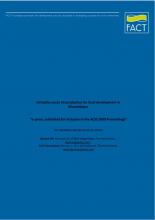Jatropha curcas oil production for local development in Mozambique "

Most research on Jatropha curcas for bio-fuel production has focused on mechanised plantation agriculture aimed at the international market. One of the few projects that have focused on Jatropha for local development among small-scale farmers is the FACT-ADPP Jatropha project in Cabo Delgado, Northern Mozambique. The project attempts to substitute diesel used locally for maize mills, water pumps and other machinery with Jatropha oil. Instead of converting the oil to bio-diesel, engines are converted to run on pure Jatropha oil. The project has been running for three years and farmers are now producing significant amounts of Jatropha curcas seeds. However seed production is still rising and it is too early to predict the yields that will eventually be reached. Oil presses and modified engines are in operation.
The population density is low and shifting cultivation dominates. The soils are sandy and no fertility enhancing techniques or inputs are used. Draft animals and mechanisation is absent. Cash crops and paid employment is almost non-existing. Liquid fuel consumption in the area is mainly diesel for mills and kerosene for lamps.
Initially the focus was on plots with Jatropha but following farmers’ preferences the focus is now on hedges around fields. Pest problems emerged early as a major concern and remains so. The main pest is the golden flea beetle; Aphthona spp which reduce growth but rarely kill the plants. Research on IPM is in its infancy and currently only chemical pesticides are known to be efficient. However, pesticides are not a feasible option for the farmers. Research that has been undertaken includes agronomic aspects, pests, seed pre-treatment, economics, carbon and energy-balance, diesel engine modification and impact on diesel engines running on pure Jatropha oil. The comprehensive research component is executed in collaboration with national and international research organisations, NGOs, companies and universities.
This presentation will provide an overview of our current agronomic knowledge, an assessment of the potential for Jatropha as a vehicle for local development as well as the knowledge gaps that remain to be filled.
Keywords: Jatropha curcas, bio-fuel, local development, Mozambique
